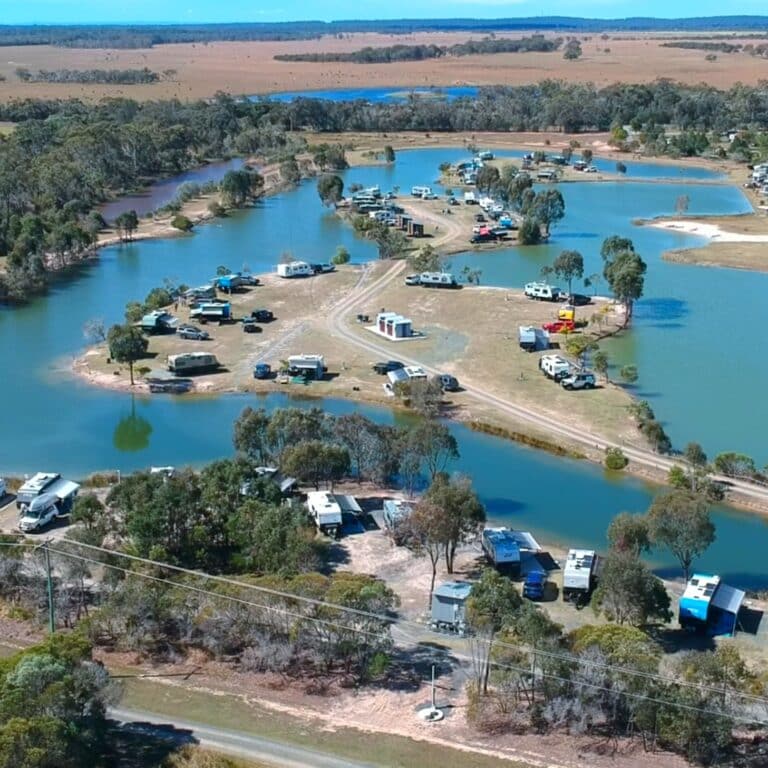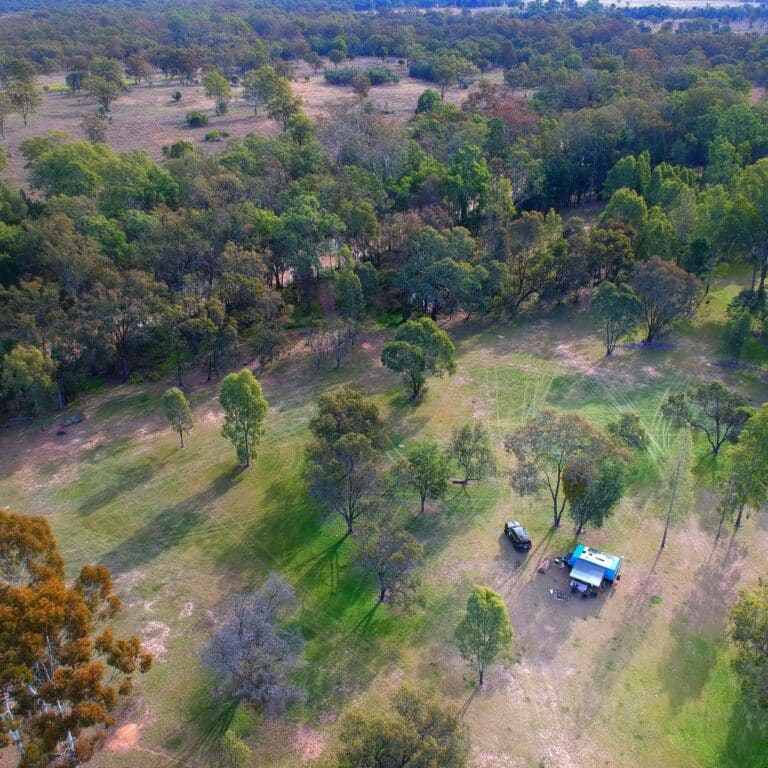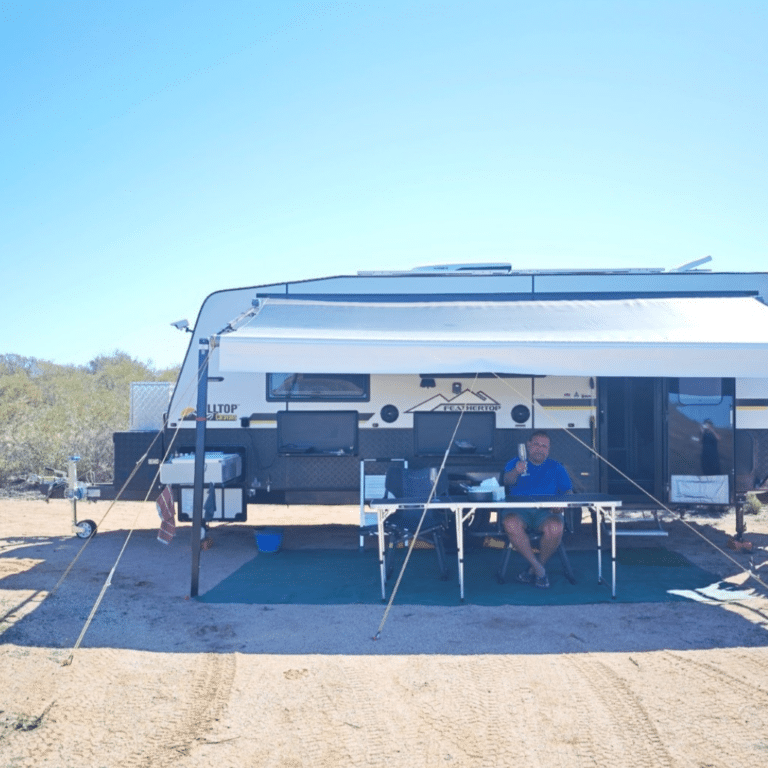Chances are you’ve heard the phrase ‘leave no trace’ before. If you’re spending time in the great outdoors though, it’s important to understand exactly what this expression means and why it’s important. Here’s what every new camper should know in order to protect Australia’s natural spaces:
What are the seven principles?
The Leave No Trace Seven Principles are designed to minimise human impact on the environment. They serve as a framework of best practices that everyone should follow to enjoy the great outdoors whilst safeguarding our natural ecosystems.
These seven principles began as a guide for people visiting ‘backcountry’ sites – those more remote areas that need to be accessed overnight by backpackers and long-distance hikers. Today, however, ‘frontcountry’ visitors are also encouraged to leave no trace when they visit more accessible outdoor spaces such as parks, picnic grounds, and drive-in camping sites. Many of us with camping trailers would be considered visitors to Australia’s frontcountry.
The Leave No Trace Seven Principles are as follows:
Let’s take a closer look at what each principle means below.
1. Plan ahead and prepare
If you’re poorly prepared in the great outdoors, you are more likely to run into trouble. Lack of appropriate research, resources, or planning can lead to unexpected situations that may put yourself or others at risk.
The principle of ‘planning ahead’ means understanding your destination and packing appropriate clothing, equipment, food and other essentials to ensure that you remain safe. Along with considering the things to take camping, the principle of ‘being prepared’ may also involve:
- Understanding local camping regulations.
- Preparing for the weather, and knowing how to keep warm while camping.
- Remaining aware of potential hazards or other causes of emergency.
- Scheduling your movements and letting others know where you’ll be.
- Using maps, compasses, and other navigational tools to avoid becoming lost.
- Having First Aid Kits available, along with the appropriate first aid knowledge
2. Travel and camp on durable surfaces
Camping on durable surfaces helps to protect sensitive vegetation, fragile soils, and other natural elements that are critical for a thriving wilderness. Trampled grasses and plants can take years to recover, whilst damage to plant growth can have detrimental effects like soil erosion.
For these reasons, it’s always advisable to camp on surfaces that are more resistant to human interference. Examples of durable surfaces may include rocky outcrops, sand, gravel, firm dry grasses, or even snow. Keep campsites small, and set up camp at least 60 metres away from lakes, streams and other waterways.
It’s also important to remain in areas where there are established tracks and campsites. Staying on designated tracks will help to minimise disturbances to our natural environment. If you’re hiking from your campsite, walk single file in order to avoid damaging any pre-existing trails.
3. Dispose of waste properly
Waste can refer to any material, substance, or product that is no longer required and must be disposed of. On a campsite, human waste can include everything from rinse water to food packaging and scraps, to solid waste. When you’re visiting the great outdoors, use the mantra ‘pack it in, pack it out’ to keep your campsite clean and tidy. Remember:
- You should inspect your campsite regularly for rubbish or spilt food.
- When it comes to camping dinner ideas, it’s worthwhile planning meals ahead to reduce the volume of waste – including liquids, food remnants, and even lingering smells.
- Be mindful of your ‘micro rubbish’ – small items that have been discarded and may be forgotten, such as cigarette filters, eggshells, or fruit peels.
- Leave no litter behind – this can be lethal to animals scavenging and can pollute fragile ecosystems.
- Everyone has a responsibility to clean up their waste before leaving a campsite.
- Always leave an outdoor space cleaner than when you found it.
4. Minimise campfire impacts
Campfires might feel synonymous with camping; however, they can also be destructive if improperly managed. In Australia, bushfires destroy thousands of kilometres of natural flora and fauna every year. It’s imperative that campers keep fires under control to avoid a natural disaster.
As a safer choice, opt for a lightweight cooking stove or portable firepit (such as this one) to prepare food. In areas where fires are permitted, use established fire rings or mound fires. Always keep your fire small and contained, and ensure your campfire is put out completely before leaving the campsite.
It’s important to remember that while campfires may feel traditional, they are no longer essential for food preparation or comfort, especially with a well-equipped camper trailer. There are plenty of camping dinner ideas that can be prepared without the use of an open fire. Our OPUS camper trailers and hybrid caravans all come equipped with 4-burner stoves.
5. Leave what you find
The mantra ‘take only pictures, leave only footprints’ is especially important for campers. Collecting reminders from your time outdoors can disrupt natural ecological processes, and may disturb sites of historical significance. Here’s how to leave what you find:
- As a rule of thumb, don’t take rocks, shells, leaves, flowers, feathers or other organic items away from the natural environment. (Or at least keep it very minimal, and nothing endangered – we know kids love finding the occasional treasure!)
- Never touch Aboriginal rock art, and be respectful towards sites of historical significance.
- Avoid introducing non-native species into wilderness areas. Always clean your boots, bikes, kayaks and other outdoor equipment between uses before moving to another site.
6. Respect wildlife
Australia is home to some of the most unique animal species in the world. Unfortunately, native species both here and abroad are under threat from habitat loss, pollution, and other ill effects. National parks and protected lands are some of the last refuges for native animals.
As campers, we each have a responsibility to preserve and protect our wildlife. Observe animals from behind a camera lens or binoculars, but only at a safe distance. Be mindful of the following best practices when it comes to animal conservation:
- Never follow or approach a wild animal.
- Never feed a wild animal. This alters natural behaviours and can expose both yourself and the animal to danger.
- Store your food and waste by-products securely, to prevent animal scavenging. Know what things to take camping to safely stow your food rations.
- Control your pets at all times, or leave them at home if necessary.
- Be particularly mindful of wildlife during mating season, nesting season, or as they raise their young.
Always make an effort to co-exist peacefully with animals in the wild. It goes without saying that you should never remove an animal from its natural habitat.
7. Be Considerate of Others
Being a kind and considerate camper means respecting other people and animals alike. Keep the following campsite etiquette in mind:
- Be courteous towards other visitors.
- Never expect to have exclusive use of public grounds.
- Share trails, space, and other resources.
- Minimise your noise to give space for natural soundscapes such as bird calls, running water, and rustling trees.
- Respect the rights of First Nations people, who are the traditional custodians of Australian lands.
What practices do you put in place to be a respectful and responsible camper? Share your thoughts with the Set Up Camp community now.



